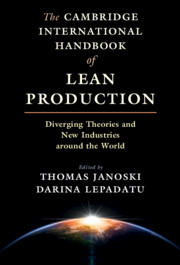 The Cambridge International Handbook of Lean Production
The Cambridge International Handbook of Lean Production Book contents
- The Cambridge International Handbook of Lean Production
- The Cambridge International Handbook of Lean Production
- Copyright page
- Dedication
- Contents
- Tables
- Figures and Sidebars
- Preface
- Acknowledgments
- Contributors
- Abbreviations
- 1 Lean Production as the Dominant Division of Labor
- Part I Theories of Lean Production
- Part II Lean Production across Industries
- 7 Challenges to Lean Implementation from a True Lean Toyota Production System Perspective
- 8 Lean Production in the Automotive Industry
- 9 Product and Process Innovation to Power the Lean Enterprise
- 10 Using a Lean Six Sigma Strategy to Be Resilient in the Telecommunications Sector
- 11 Lean Transformation in Healthcare
- 12 The Adoption of Lean Thinking by Legal Services Providers
- 13 Lean in Public Services
- 14 Mass Merchandizing and Lean Production at Walmart, Costco, and Amazon
- 15 Lean Management Systems and the Use of Financial Information
- 16 Lean Workflow and Quality Assurance when Creating Software-Intensive Products and Services
- Part III Lean Production Around the World
- Name Index
- Subject Index
- References
7 - Challenges to Lean Implementation from a True Lean Toyota Production System Perspective
from Part II - Lean Production across Industries
Published online by Cambridge University Press: 11 March 2021
- The Cambridge International Handbook of Lean Production
- The Cambridge International Handbook of Lean Production
- Copyright page
- Dedication
- Contents
- Tables
- Figures and Sidebars
- Preface
- Acknowledgments
- Contributors
- Abbreviations
- 1 Lean Production as the Dominant Division of Labor
- Part I Theories of Lean Production
- Part II Lean Production across Industries
- 7 Challenges to Lean Implementation from a True Lean Toyota Production System Perspective
- 8 Lean Production in the Automotive Industry
- 9 Product and Process Innovation to Power the Lean Enterprise
- 10 Using a Lean Six Sigma Strategy to Be Resilient in the Telecommunications Sector
- 11 Lean Transformation in Healthcare
- 12 The Adoption of Lean Thinking by Legal Services Providers
- 13 Lean in Public Services
- 14 Mass Merchandizing and Lean Production at Walmart, Costco, and Amazon
- 15 Lean Management Systems and the Use of Financial Information
- 16 Lean Workflow and Quality Assurance when Creating Software-Intensive Products and Services
- Part III Lean Production Around the World
- Name Index
- Subject Index
- References
Summary
The objective of this chapter is to introduce the University of Kentucky IR4TD Lean Systems Program (LSP) and the concept of “True Lean,” as well as to discuss what we have observed to be critical challenges (derailers) to the successful implementation of Toyota Production System-(TPS)-based principles within non-Toyota organizations. This learning stems from experience teaching, coaching, and facilitating lean implementation activities in a wide range of industries over the past twenty-five years. Participants in the LSP Lean Certification program have been sent by over 175 companies representing industries from healthcare, steel, glass, ceramics, textiles, automotive, railroads, aerospace, commercial aviation, fast food restaurants, and food processing manufacturers as well as government, education, and NGOs. This chapter shares data collected from our staff and clients in an effort to help understand the current condition of lean in industry today and the major challenges confronting successful lean implementations.
- Type
- Chapter
- Information
- The Cambridge International Handbook of Lean ProductionDiverging Theories and New Industries around the World, pp. 179 - 203Publisher: Cambridge University PressPrint publication year: 2021
References
- 1
- Cited by
